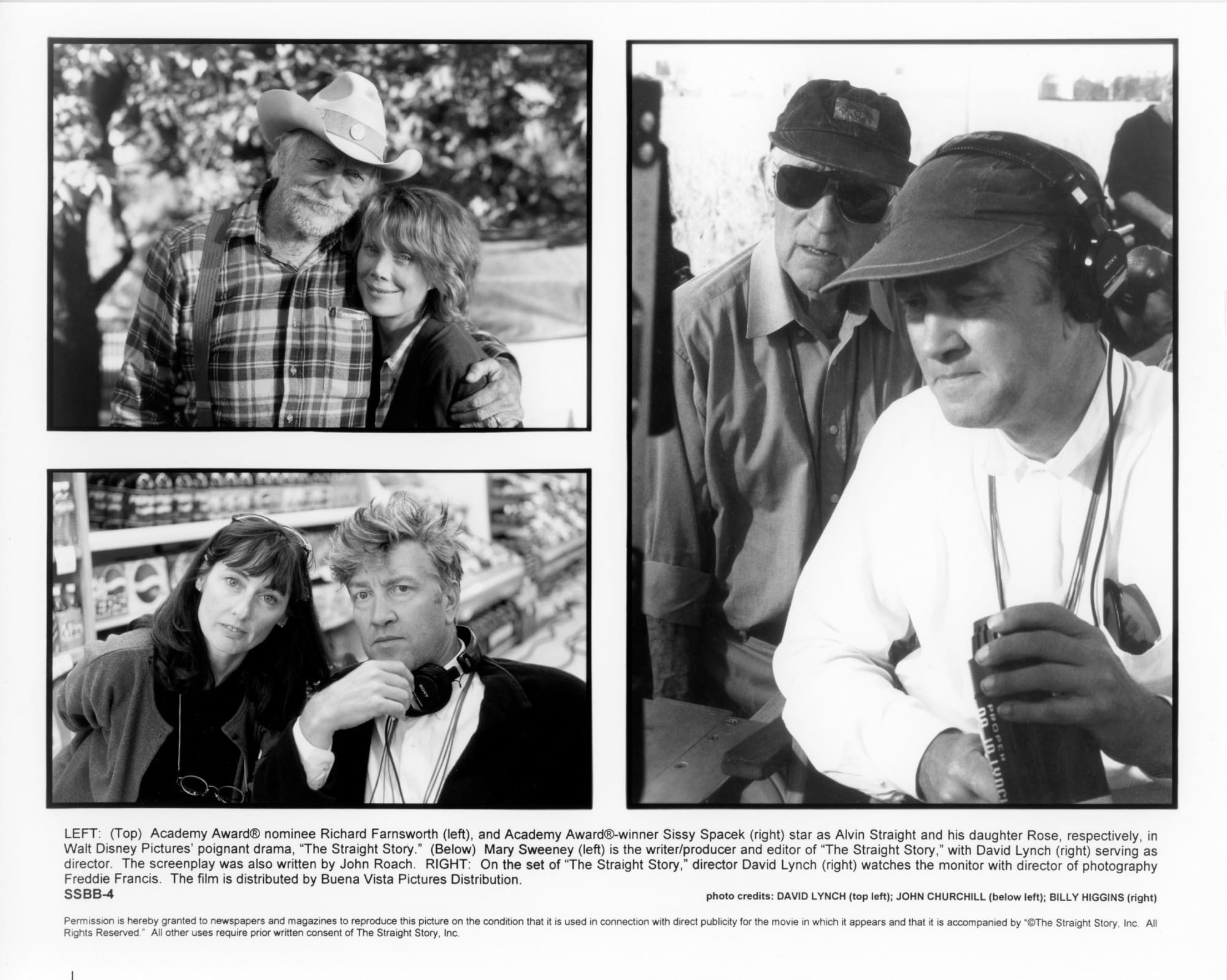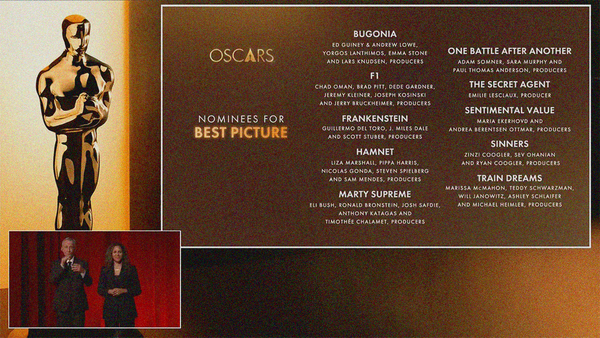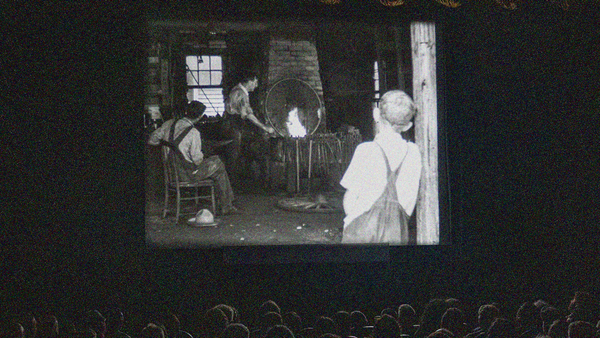Week Ending 8/1/25
Fantasia 2025 - Week Three
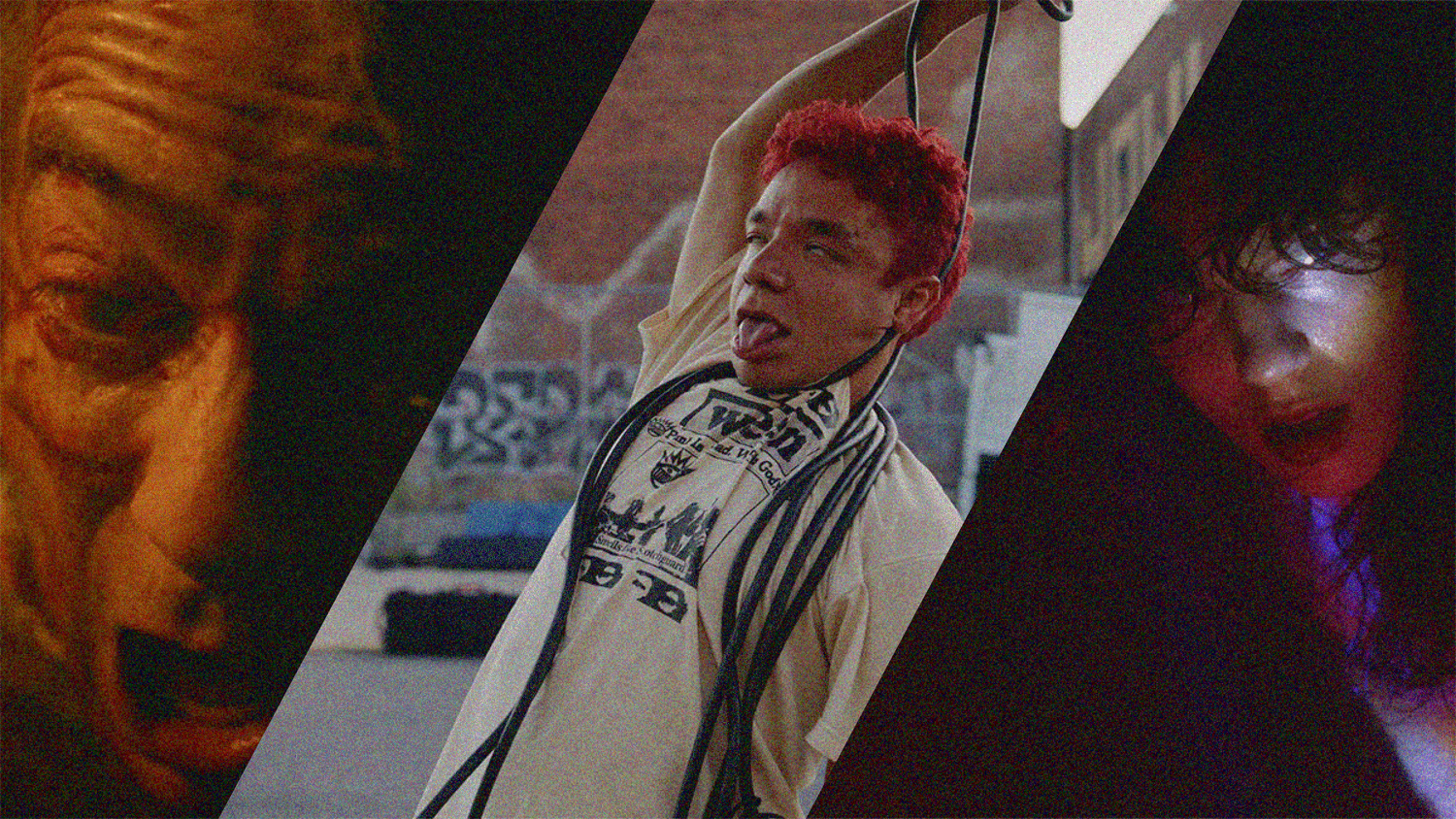
The below is a wrap on Fantasia 2025 for me. Seventeen films reviewed in total. None of them had me regretting my decision to seek them out (since I didn't intentionally seek out the one I didn't enjoy). And I only received one outright rejection because I wasn't ranked as being a "confirmed press partner" with the studio. So, all-in-all, another great year.
It's always fun to see some of my faves getting awards love too.
Fantasia mainstays The Adams Family's Mother of Flies became the first American feature to win the Cheval Noir Award for Best Film. What a wild stat considering the festival is in its twenty-ninth year.
The other Cheval Noir winners:
• Best Director went to Hadrah Daeng Ratu for The Book of Sijjin and Illiyyin.
• Connor Diedrich and Samuel Johnson won Best Screenplay for Terrestrial.
• Best Cinematography went to Alex Metcalfe for Cielo.
• H6LLB6ND6R got the Sandro Forte Award for Best Motion Picture Score on Mother of Flies.
• Bakhytzhan Alpeis and Ui Mihara won Outstanding Performances for Stinker and I Fell in Love with a Z-Grade Director in Brooklyn respectively.
Other awards:
• Alexander Ullom's It Ends won Best First Feature in the New Flesh Competition (Annapurna Sriram's Fucktoys and Brock Bodell's Hellcat got special mentions).
• Yu Ao and Zhou Tienan's The Girl Who Stole Time won the Satoshi Kon for Excellence in Animation Competition (Ambriz Brothers' I Am Frankelda got special mention).
• The Northern Excellence for Best Canadian Filmmaker went to Chloé Cinq-Mars for Peau à peau (special mention to Simon Glassman for Buffet Infinity).
• The Quebec Association of Film Critics awarded Laura Casabe's The Virgin of the Quarry Lake as their Best Film.
And now I get a couple weeks of rest before TIFF screeners start to arrive.

Buffet Infinity
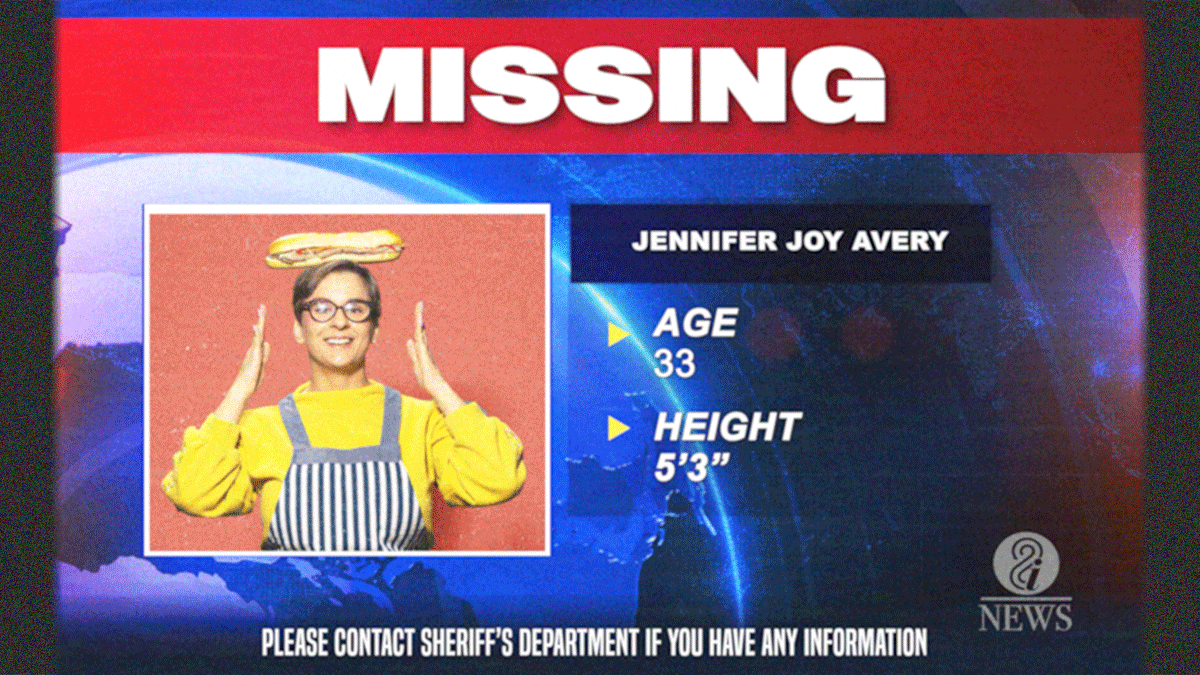
To truly get an idea of how far writer/director Simon Glassman is willing to go with his unhinged, overlong, and unforgettable Buffet Infinity, look no further than his decision to credit himself as Buffet Infinity. I thought it was another gag where he sprinkled in the title here and there to be caught by anyone willing to keep watching, but then the final frame reveals it's just ... him. He has become the movie. The movie has become Simon Glassman. We haven't been watching a television or someone else watching a television. We've been watching the filmmaker's mind as it's being hijacked.
It's the only explanation I've found that allows for the continued devolution of advertisements and news broadcasts to eventually knock down the fourth wall separating the actors from their characters without also knocking down the fourth wall separating them from us. We don't need to guess when the vantage point shifts (since the continued aspect ratio and tracking noise provides a consistent truth to the fiction) because there's no television to escape. No, this is a person overwhelmed by propaganda, partisan politics, emotional insufficiency, gluttony, and isolation. A person retreating into the nostalgic comfort of artifice in an attempt to survive their own psychological demise.
Or maybe it was just a TV screen revealing an Alberta town's rapid decline at the hands of a cosmic horror begat by a science fiction guru's hubristic desire to become God. If so, its refusal to leave its channel surfing convention behind to delineate between reality and programming renders it impossible to parse. Because I was all-in for the first fifty minutes as local businesses started to throw petty barbs of competitive bile around while also building background alliances with each other. Buffet Infinity's malicious expansion is the catalyst and the sudden disappearances supply the perfect opening to steal control.
Watching as Jennifer Joy Avery (Allison Bench) subtly denigrates Buffet Infinity to bolster the reasons why people should eat one of her sandwiches (in the same plaza) instead of their smorgasbord before they respond by attacking her like a political opponent was fantastic. So too was the gradual radicalization of Mosley Rosin (Kevin Singh) from personal injury lawyer to corporate stooge. And the reinforced defensiveness of pawn shop broker Ahmed (Ahmed Ahmed) and used car salesman Captain Savings (Brandon Vanderwall) because of their increase in inventory coincides with a missing populace epitomizes today's straight line between profiteering and waning empathy.
Throw in Langdon Hershey's (Dino Primo) Scientology-adjacent entrepreneurism setting the stage for indoctrination and a trio of recurring actors hawking dark insurance analogies (Claire Theobald), conformity via mattresses (Siobhan Theobald), and a lack of self-control (Donovan Workun) and the airwaves are literally softening up their viewership to pave the way for whatever force has arrived in the community of Westridge. As such, I kept waiting for the screen to expand and the fuzz to vanish to finally see what this pervasive signal wrought. So, it's jarring when that reveal arrives within the confines of said airwaves.
Not in the "cool" surreal way, but the "I think they missed a step" way. That's why I'm going to cling to that credit of Buffet Infinity as Simon Glassman to make it so everything is intentional. That way, I can see all these figures as pieces of a fracturing psyche. Impulses and urges of a mind being pushed and pulled by an unknowable force manifesting itself as imagery Glassman's mind would deem familiar and safe before eventually turning against him. It's not a perfect read of the film considering how much of the first half demands an earnest read that Westridge is real and falling victim to a hostile takeover of the senses, but it tips my scales towards the positive rather than negative.
As it should since my experience with Buffet Infinity was positive. Its Adult Swim/"Too Many Cooks" influences are obvious and its desire to dial-up the discomfort as a means of dialing-up the humor is always a plus in my book. Could things have devolved quicker to knock fifteen to twenty minutes from the runtime? Sure. Could the squid/God aspect have been fleshed out more coherently? Maybe, but sometimes the randomness of such "answers" creating additional chaos is better than spelling everything out. This is a uniquely strange and satisfying journey into insanity. Feeling unsure about it is a feature.
One qualm that does remain a sticking point regardless of my read, however, is the pervasiveness of misspellings. At first I thought it was fun because it seemed to only be happening with Buffet Infinity content—an entity pretending to be human and doing it poorly. But then it started showing up elsewhere too. Perhaps a sign of the populace's cognitive decline (by way of Glassman's mind) due to the "sound" (Buffet Infinity's commercial narrator) and our post-capitalist consumerism as social service conditioning? Maybe a product of the "Eight instances of AI use for satirical purposes" stated in the credits?
I'll chalk it up to being another Easter egg in a film stitched together from a basket overflowing with Easter eggs until some ads and actors start absorbing into each other. I'm certain that when Buffet Infinity becomes available to the general public, someone will break it down in chart form to try and figure out all the references and connections (whether present or imagined) at the back of its manmade evil vs. supernatural evil drama. Others will merely enjoy the fun bits like its never-ending stack of angus beef and wild toppings that's so beholden to its inability to end that the chef must die before ever finishing it off with its bun topper.
6/10
Flush
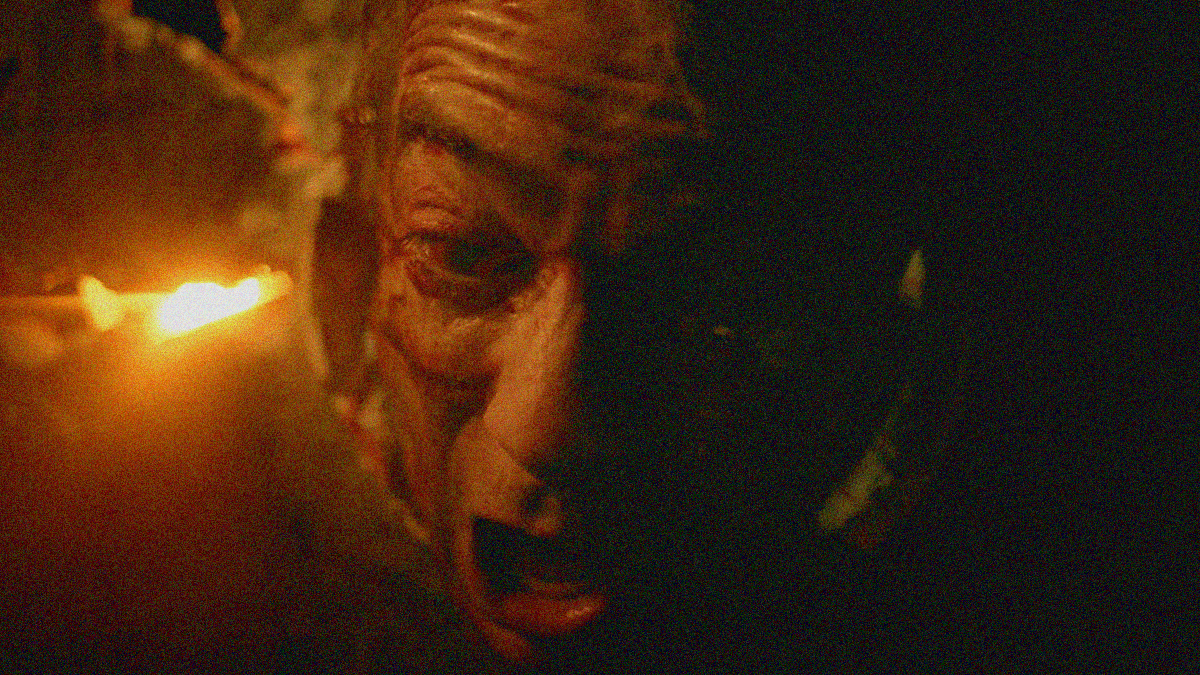
In a last-ditch effort to prove to his parents that he's fit to raise his own daughter, Luc (R. Jonathan Lambert) heads to the club where his ex (Élodie Navarre's Val) works to snort a gram of coke in a basement toilet stall and coerce her into answering her phone by saying he's in the building. Yes, he said he'd quit the drugs, but he needs the extra courage since he can only see Zoé if both he and Val attend her birthday party. Luc has burned this familial bridge too many times to be trusted alone or to be believed that Val is staying away on purpose and not because of him. So, it's now or never. It's time to pull out all the stops.
Unfortunately for Luc, however, the mix of anxiety, adrenaline, and narcotics has him vibrating out of his skin. One slip on the porcelain and his foot gets caught in the hole. Now he's panicking. He starts flailing around so the camera can investigate the space and reveal the lock mechanism on the door, the xenomorph glory hole on the wall, and the flush chain hanging above the squat pan. And to make matters worse, his joy in finally breaking loose coincides with the arrival of Dindon (Rémy Adriaens). He's the dealer who sold Luc the gram and now thinks this estranged dad stole his stash. Why? Because it was hidden in that toilet.
This is where the initial comedic chaos of Luc's implausible situation turns dark with director Grégory Morin and screenwriter David Neiss introducing Dindon's boss Sam (Elliot Jenicot). He and his pet rat Rabla can smell liars and, since this case of mistaken identity quickly turns into a case of greed-fueled idiocy, the accused is setting off alarm bells. Cue a fit of rage and the premise Flush promises officially comes to fruition with Luc on his knees, arms outstretched, and head smashed through the porcelain. Bloodied, bruised, at risk of drowning, and unable to clearly instruct his phone's AI to help, the clock on his survival ticks.
Set in this stall for the duration, Morin must pull out all the stops to keep things visually interesting. That means showing us his hands blindly fishing around for assistance from above and his head desperately searching for answers from below. Sometimes it's about showing the two vantages working together (plugging headphones into his phone before feeding the bud down a crack in the porcelain in hopes he'll be better understood). Sometimes its adding drama by pulling back within the drainage pipe to show how waste from the next stall over eventually flows into his face.
Neiss has concocted some crazy scenarios for Morin to solve and each one gets more deranged as they go. From needing to bite and pull a tampon out of the drainage hole after someone flushes to accidentally losing an appendage in a bid to loosen the jagged piece of porcelain threatening his carotid to a stranger finally supplying that xenomorph its payoff—Luc would probably be better off letting himself drown to put an end to his suffering. But he loves his daughter and refuses to let her think of him as a screw-up like everyone else. I mean, he is a screw-up. He does nothing to refute that reputation. He's trying, though.
Urine and feces eventually make way for blood as fear-driven mistakes lead to injuries and the rising sun signifies closing time and a return of Luc's aggressors to finish the job. Some of the actions forced upon his character appear sadistic for torture's sake, but know that each one also brings a narrative purpose later on. Nothing that Morin and Neiss add or inflict is random and Luc has no choice but to try and use everything at his disposal to stay alive long enough for an escape. It demands an unhinged performance from Lambert that maintains its underlying sorrow throughout the lows of terror and the highs of relief.
The graphic nature of the locale won't be for the faint of hearts. A lot of the violence is delivered in quick bursts or off-screen, but the filth of bodily waste and fluids is unavoidable. Luc is consuming toilet water, chomping into flesh, and having his wounds cauterized by chemical cleaners. His screams are near constant and his pleas for anyone to believe his circumstances aren't a joke render him an exasperated mess. Think the toilet scene in Trainspotting lasting a full seventy-minutes of drug-addled paranoia, rage, and regret without the dream-like ability to simply swim out. Is it all a lesson for Luc to finally quit the coke? Maybe. But he might need to snort some more first.
7/10
Foreigner
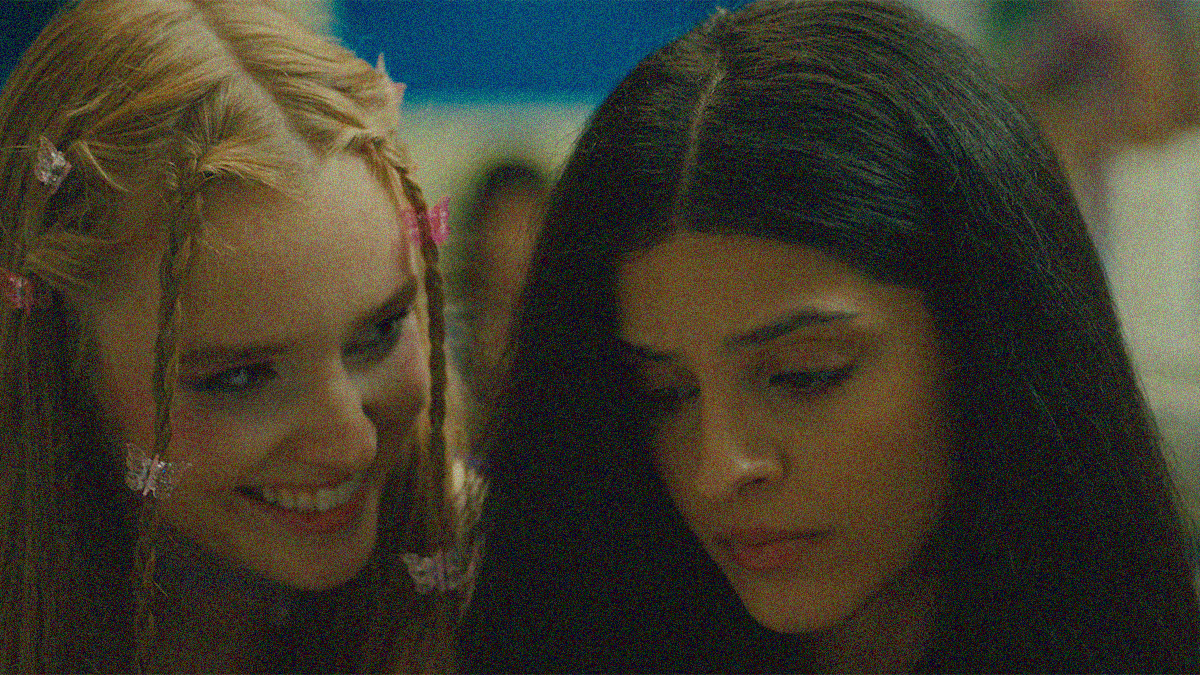
Yasamin (Rose Dehgan) has arrived in Canada—fulfilling a promise made by her North American culture-loving mother years prior. Sadly, this high schooler is only being accompanied on the journey by her father (Ashkan Nejati's Ali) and grandmother (Maryam Sadeghi's Zoreh). We don't yet know for certain what happened to her mom, but we can assume the worst due to Yasi's inherited obsession with fitting in amongst the West. She wears out an old sitcom VHS to perfect her English and flips through a Teenybopper-adjacent magazine to stay up on the latest fashion trends for optimal assimilation. Because, despite her grandma's advice to be emboldened by and cherish her uniqueness, Yasi needs others to love her first before allowing herself to do the same.
Intentionally treading a path through the aesthetic tropes of a Mean Girls or Heathers, Ava Maria Safai's Foreigner quickly takes on a much more sinister slant once the bell rings to end Yasi's first Canadian classroom experience. In just the brief moment between reaching down for her bag and looking up with the intent to leave, three students have suddenly appeared before her with creepily menacing grins. Kristen (Talisa Mae Stewart) and Emily (Victoria Wardell) don't utter a word as they flank Rachel (Chloë MacLeod) so she can take point on the trio's casually racist introduction. It's a mix of curiosity, dominance, and misplaced duty since their fascination is less about learning about Yasi than it is wondering if they can strip her down and build her back up in their image.
In that way, the film perhaps finds more similarities to Neil LaBute's The Shape of Things as far as the psychological rewiring of its lead goes. Because Yasi's family sees what's happening and try to talk sense only to be shutdown with the excuse that her friends know best. The trouble with needing acceptance from others before giving it to yourself, however, is that you lose your grip on knowing whether your choices are a result of their demands or a self-fulfilling prophecy of what you've already demanded from yourself due to the stress of emotional and geographical upheaval. I look to the fact that Safai fast-forwards a week from the day Yasi buys blonde hair dye before showing her use it. Rachel wasn't forcing her to do it right away. Yasi merely used her enthusiasm to justify it.
Because she's been on this road towards assimilation well before meeting her new friends. She's been watching that VHS tape and scouring those magazines under the auspices of "homework" to be a good Canadian ... and, by extension, a "normal" human being. Yasi is coming at this entire experience from a place of othering herself as a default defense mechanism against the inevitability of strangers doing it—so it won't hurt as much. By refusing to give her classmates or her new community a chance to judge her poorly, however, she also takes away their ability to actually accept her as she is. It's no wonder that she has left herself open to being possessed by a zār—an entity that craves control.
Well, that's what I'm getting from some minor research into the subject since its arrival as a plot point comes much closer to the end than anticipated. So much closer that one late cut had me wondering if everything we'd seen was a dream. That's how little Safai digs into the zār's purpose, origins, or demands. It becomes a "generic demon" as a result—disappointing considering the platform a Persian story could have given this very specific Horn of Africa and Middle East-based spiritual "wind." It serves as a metaphor for Yasi's internal conflict between identity and appearance or culture and desire. An excuse for the rebellious actions of a teen pushing her true lifeline away to embrace the supposed security of tourists orbiting out of curiosity rather than compassion.
I hate to say it, but I don't think the finished film would be any different if that aspect was removed entirely. That's how shoehorned in it feels and how much it serves as a mask to what one could already construe as the influence of consumerism and Western media (which connects Yasi to her mother regardless of the zār's presence). The one thing it does add is a supernatural monster-fication of this young woman that teases something crazy only to be what's stopped in its tracks by the aforementioned cut. Sometimes the film feels just as unsure about its identity as its lead by suppressing its Persian-ness so as not to alienate its Western audience. Perhaps another layer to the commentary? Budgetary constraints?
Either way, I did enjoy Foreigner's contemporary spin on the genre and its use of the immigrant experience as a basis for horror (the scene where Yasi meets Rachel's parents conjures the same discomforting sense of uneasiness as the Armitages' party guests sizing up Chris in Get Out). Safai's script is at its best when its sprinkling in the "Oops, did I do a racism again?" dialogue and retractions both because of the authenticity of the impulse and the performances (especially MacLeod) that ensure we know they weren't slips. It provides Dehgan a great showcase to play against in her feature debut, effortlessly shifting from abject terror to indignation to body-snatched bubblegum vacancy.
6/10
A Grand Mockery
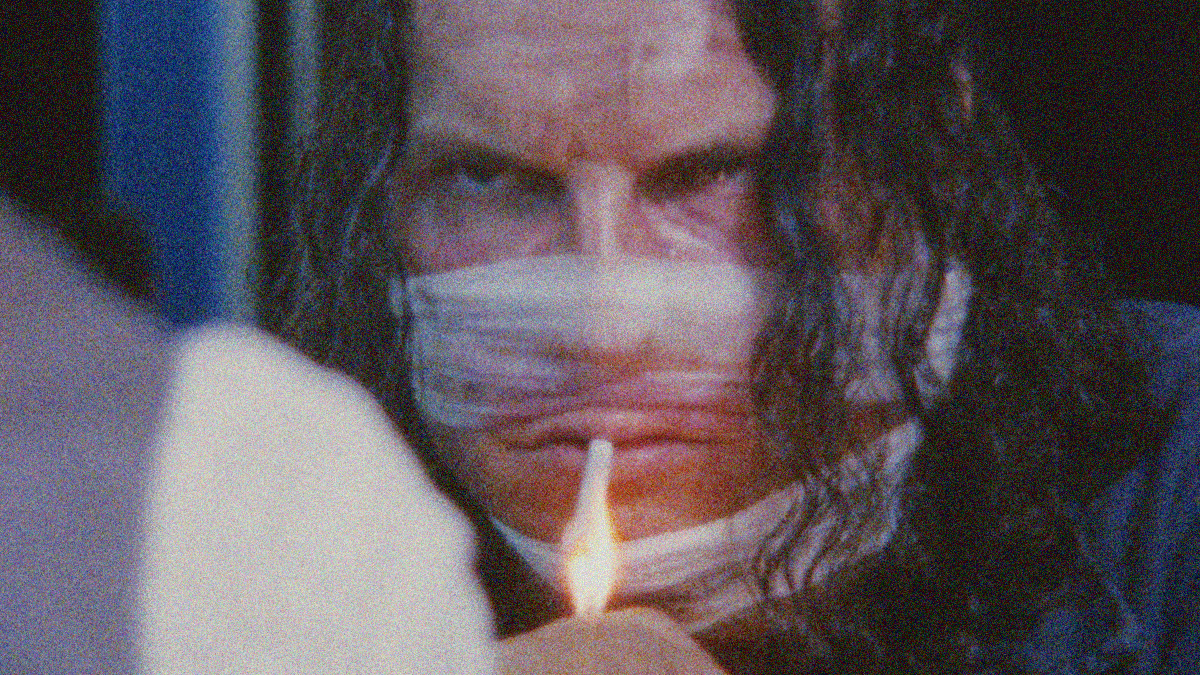
Sam Dixon and Adam C. Briggs' A Grand Mockery is very much not for me. I knew that going in, but a mix-up found me with an opportunity to watch it anyway. So, I figured it was worth a shot. Maybe it would surprise me.
I was with it for the first half of Josie's (Dixon) journey too. The reality of his slow decline into insanity courtesy of a dead-end job cleaning puke at a movie theater and a solitary hobby of recording messages about the dead to leave for a friend within the confines of a local cemetery. Weird doldrums type stuff devolving to the point where his girlfriend (Kate Dillon's Nelly) can't help but worry.
And then he disappears.
The film presumably shifts focus onto Nelly as she searches for answers, but that too abruptly ends en route to introducing Mr. Josie—a carbon copy of Josie except for a large growth on the side of his face. He has the same job and problems, but the repetition of scenes we've already witnessed suddenly take on an otherworldly surrealist slant with blatant sexual overtones.
There's stuff about being a "work of art" until the reality of objectification proves too degrading to stand. There's stuff about sexual energy as a corruptive force wherein celibacy becomes necessary for survival. And there's a bar scene that strives for Club Silencio levels of metaphor a la Mulholland Drive that ultimately achieves superficial strangeness a la Live's "Freaks" music video instead.
It'll surely hit for those on its wavelength, but I couldn't get there. Not because of the lack of plot or the impressionistic qualities of its nightmarish atmosphere (I did love the theater patron needing a beer and his return to the screen ... twice), but because I simply can't wrap my head around the filmmakers' intent beyond strange for strangeness' sake. If that truly was their goal, I guess they succeeded.
4/10
Hellcat
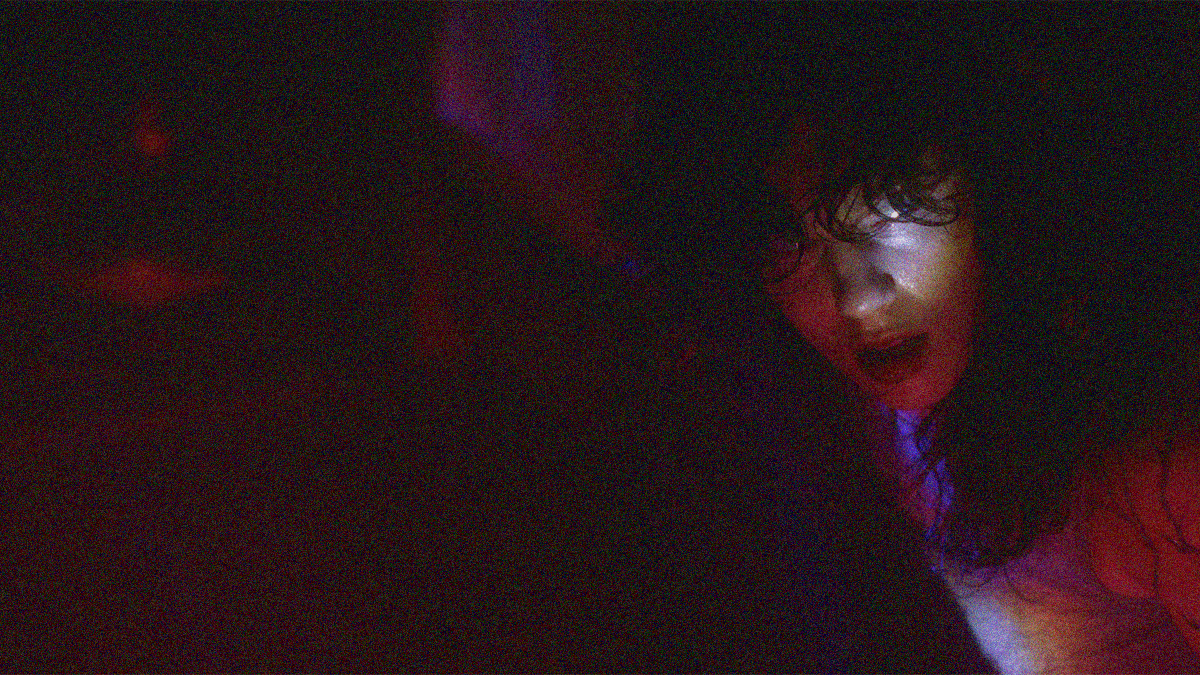
"Nothing that unfolds is necessarily surprising in its authentic cause and effect, but the final thirty minutes are definitely unexpected."
Full thoughts at The Film Stage.
I Fell in Love with a Z-Grade Director in Brooklyn
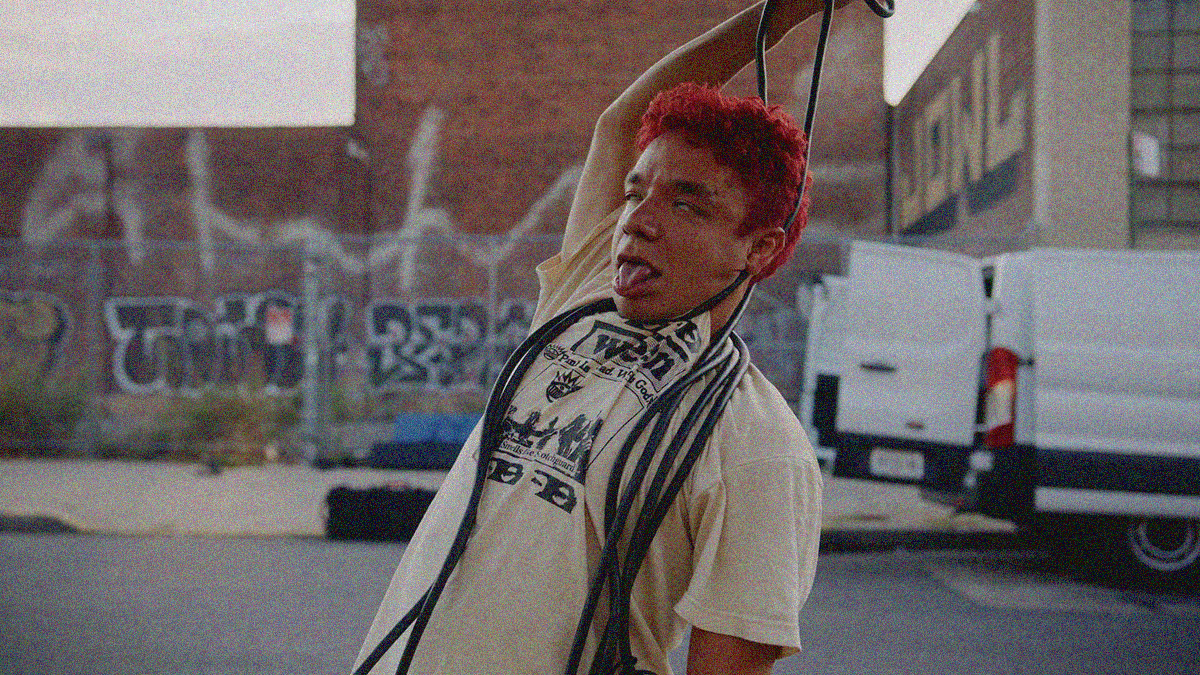
Shina (Ui Mihara) has grown apathetic towards the movie industry in Japan. Although she only pursued acting as a career because it was the one thing the world didn't simply give her sight unseen, she'd learned to love it. That's what happens when you put your all into something in order to succeed instead of just going through the motions because success was inevitable. So, suddenly feeling the latter about this hard-fought passion despite all that work places her at a crucial crossroads. Should she just keep going because it's easy? Or should she head to America in hopes of finding new inspiration?
Jack (Estevan Muñoz) has conversely grown apathetic about the movie industry in New York City. He'd like to believe he isn't the type of person who'd say he'd die without cinema, but ... he'd die without cinema. So, he left Portland for the opportunity to get in on the ground floor of Crummy Productions (run by Larry Fessenden) and one day make a name for himself in lights. But, years later, he's still just an assistant whose dream feels wholly out of reach. The only thing left to do is shoot his own film and hope putting the production on his shoulders will reignite that passion. Unfortunately, his lead actress just quit.
Kenichi Ugana's fantastically titled I Fell in Love with a Z-Grade Director in Brooklyn starts with the perfect set-up for kismet. Jack needs an actor willing to commit. Shina needs a director with the childlike innocence to make a project feel like fun rather than work. Not only are they from two completely different worlds geographically (they need his phone to translate until rapport and empathy makes it so they understand each other despite the language barrier), they're from two different genres too. She wonders why Jack and his barebones crew keep laughing while making a horror film. He's so oblivious to Shina's fame that he tries to assuage her doubts by saying "acting is easy."
You can guess how things progress from there. Not because Ugana's script is obvious, but because his intent isn't to shock. This is a cutely sentimental rom-com reminding its characters (and the audience) that life is too short to place wealth and fame above happiness. It's too short to discover you only keep your boyfriend (Katsunari Nakagawa's Ren) around as a commodity to bolster your image and not because you have any true love towards him. It's too short to worry about one-star reviews or whether your film will make it into theaters when worrying is a luxury because it means you actually made something.
They both blindly leap into the abyss together due to Ugana intentionally having them not seek a better way to understand each other. Because not being able to talk and be heard also means not being able to talk yourself out of doing something. It becomes about trust and energy rather than appearance or reputation. The sheer joy Jack and company exudes for no other reason than filming a scene (regardless of its quality) becomes infectious for Shina. She's excited to come to set because she has zero clue what might happen beyond the fact that it will be a good time. No money equals no pressure.
So, the world inevitably intervenes for some conflict beyond whether their lack of a permit might shut them down. Someone will recognize Shina and unwittingly bring the weight of celebrity and expectations back into her mind. Will she let them consume her again? Will the voice calling Jack a hack and everything she's doing a waste of time subdue the reality that she'd rather goof around in blood with friends than go back home to sterile sets and uninspired junkets? Yes, there's a blossoming romance and the desire to finish what she started, but the main theme here is that choosing the "safe" bet is often a recipe for boredom.
It's an earnest message told earnestly. It must when you're dealing with a juxtaposition between a consummate Japanese professional and an emotions-on-sleeve American manchild. Think too deeply and Jack becomes too annoying to bother with and Shina too talented to let herself be blackmailed into performing in an underground film. You become the exact person in desperate need of listening to what this movie preaches. Because making that central dynamic and their actions so big is purposeful. It's about holding a mirror up to oneself to realize something must change and there's a difference between exuberance and immaturity. We should all aspire to feel like children again.
6/10

She Rides Shotgun
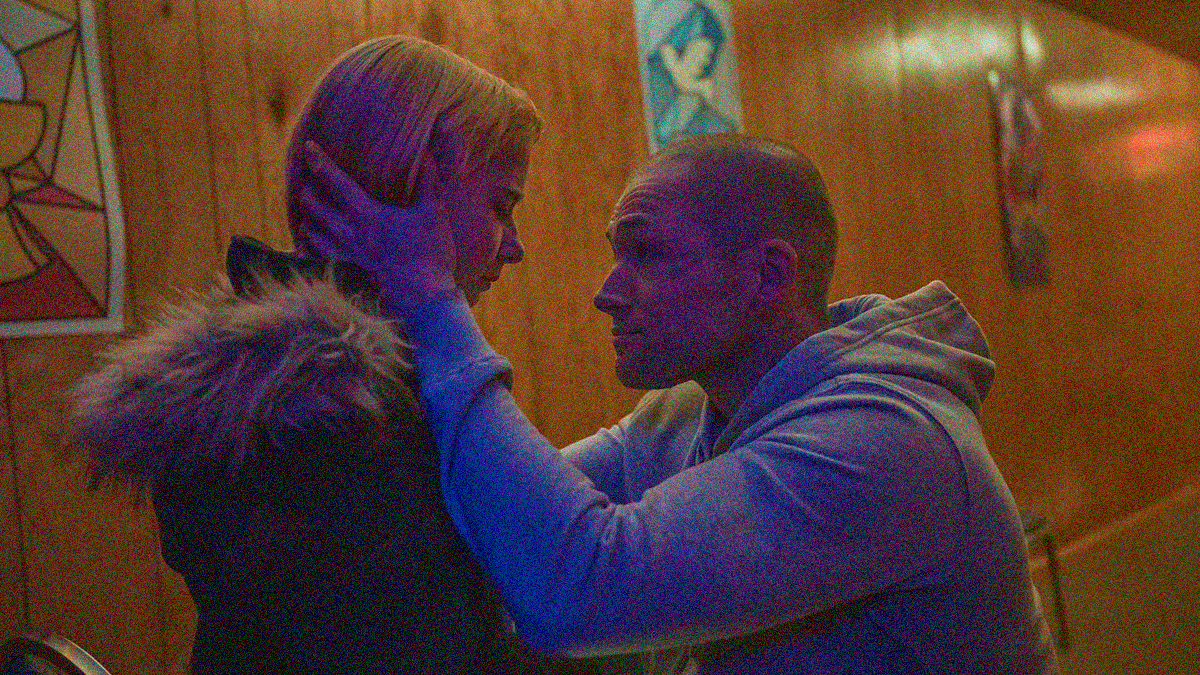
Anyone who's seen Nick Rowland's Calm with Horses will be happy to hear he's found another script with similar gravitas and complexity insofar as its familial love caught within a crime thriller premise. Adapted by Ben Collins, Luke Piotrowski, and Jordan Harper (from the latter's own novel), She Rides Shotgun again sees a father caught inside a localized web of circumstances that quickly spiral outside of his control. Because Nathan McClusky (Taron Egerton) is a good man—at least he's always had the capacity for goodness despite the bad things he's done in life. And just because he hasn't been around or able, he'll do anything to protect his child from the world he's chosen.
Unlike Rowland's feature debut, that child actually takes the lead here. We meet ten-year-old Polly (Ana Sophia Heger) as she's waiting for her mother to pick her up after school. She's justifiably frustrated about the time that's passed, but she's confident mom is simply running late ... again. What she couldn't have expected, however, is that the car speeding around the corner and beckoning her to get in is being driven by her father instead. Why? Because they haven't spoken in years since he's been in jail. Her trepidation isn't therefore about the man holding open the car door, but the lack of clarity as to why he's there at all.
While we can easily guess, our initial assumption won't be entirely correct. Yes, Nathan is a killer, but he'd never hurt a loved. Not Polly. Not his ex. Not even her new boyfriend since doing so would ultimately hurt them in the process. No, his haste isn't because of what's already happened, but because of what's still coming. Nathan has been green-lit and everyone even remotely close to him won't just be at risk of getting hit by crossfire, they'll also be targets due to his pursuer's scorched earth, Biblical rage. This figure (John Carroll Lynch) doesn't simply call himself the God of Slabtown because it sounds cool. He believes it.
The film is thus about Nathan and Polly on-the-run. He tries to find friends willing to help, but the group after him (the Aryan Steel) pretty much own the entire area. And those who aren't on the payroll are too scared to act like it. It's why Nathan is in this situation in the first place considering he isn't a member himself. But his brother was and his protection inside was and most of those friends (like Odessa A'zion's Charlotte) know little else. It's so bad that the cops on his trail (Rob Yang's John and David Lyons' Jimmy) are even arguing about how to proceed: exploit Nathan to finally erase Slabtown's meth empire or keep their heads down.
Our draw, however, is the father-daughter dynamic at the center. Here's a young girl who knows her dad loves her, but also knows what he's capable of doing. Does Polly therefore trust him implicitly and put herself at risk as a result or does she notify the authorities to try and save Nathan from himself? It really comes down to whether—through no fault of her own—she believes she's dead either way. If her options for safety are to put her life in the hands of the police (who may or may not be dirty themselves) or her father, why not run with the one she knows will die to protect her? Maybe they'll even get to know each other along the way.
Egerton is great as ever toeing the line between homicidal aggression and tearful empathy. His Nathan enjoys guiding Polly through pettier crimes to keep them in fresh wheels and money, but draws the line on letting her sink so far that she'd ultimately get lost following him like he did following his brother. As such, it's Heger who must shoulder a lot of the emotional weight by responding to his mercurial shifts. Credit her and Rowland for finding the authenticity in a role that could have been one-dimensionally drawn as a pawn to her father's whims. They instead show the reality that her age has trouble distinguishing when Nathan is angry with their circumstances rather than her.
She Rides Shotgun is very much a character piece because of this, but its narrative is also effective beyond providing them the room to shine. I love the choice to keep the God of Slabtown an anonymous boogeyman until the story demands a reveal (not of the actor, but why he is akin to God). The use of Yang's Detective adding extra moral gray to already muddy waters as a mirror version of Nathan is a nice touch too. My only quibble is how the script injects Polly into the climactic shootout—both because of the ineptitude of those around her allowing it and the overt melodrama that results. Thankfully, Rowland and company stick the landing anyway.
8/10
The Sparrow in the Chimney
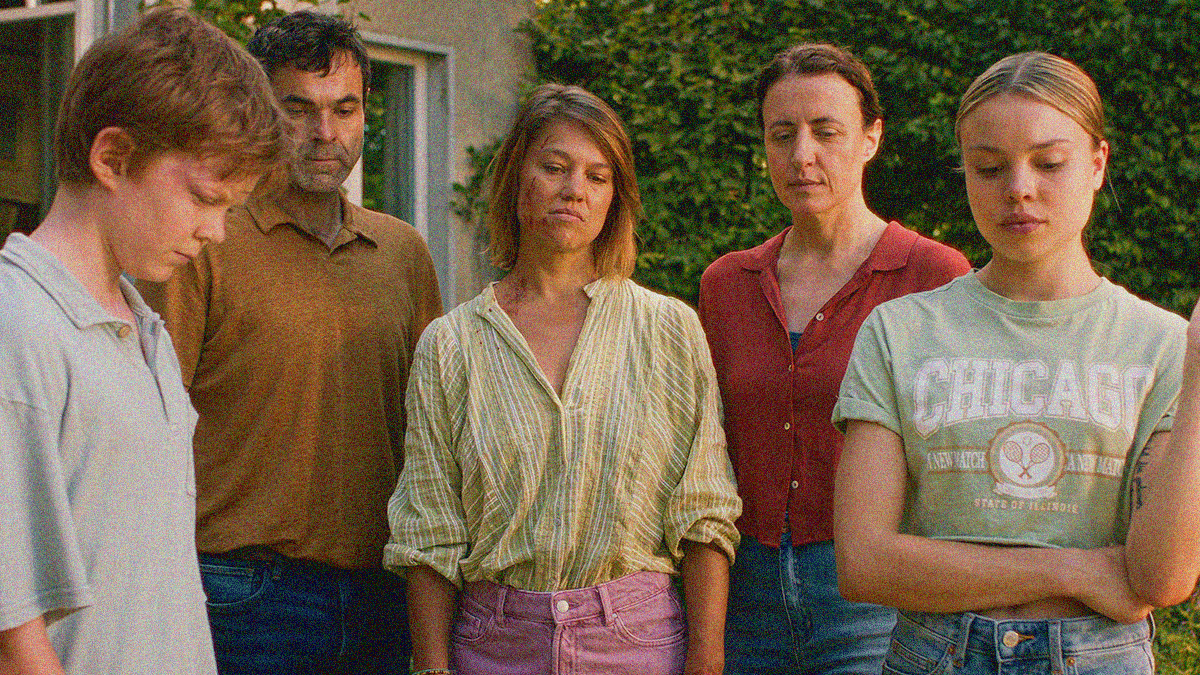
Jule (Britta Hammelstein) never understood why her sister Karen (Maren Eggert) moved her family into their old childhood home upon the death of their mother. She remembers how much they both hated that property. How much they both hate her. It's why Jule got out when she did without every looking back. She escaped the stifling nature of their mother's gaze. The anxiety of feeling as if her mom would kill her if given the chance. So, why would Karen return? Why would she risk opening those wounds and letting the demons of the past ravage her present? Because it was never a loving home. It's where love went to die.
As we soon discover courtesy of Ramon Zürcher's impeccably drawn script for The Sparrow in the Chimney, that fact remains. Karen and Markus's eldest daughter Christina (Paula Schindler) fled like Jule yet still can't shake the call of its dark force like her mother. Teenaged Johanna (Lea Zoë Voss) feels the anguish caught within those walls with a white-hot anger, constantly fighting with Karen as a means to keep from losing herself to its grip. And young Leon (Ilja Bultmann) is so confused as to the chaos surrounding him that he at once despises his mother while also trying to please her. This place's hold has grown on them all.
So, bringing the whole extended family under the same roof is just begging for turmoil. Not only because the reasoning centers on Markus's birthday despite him and Karen being on the brink of divorce, but also because Jule and Christina are coming back. That's both a catalyst for Johanna and Leon to remember what they've been missing without their sister (as well as the jealousies they harbor from being unable to follow) and an opening for Aunt Jule to reveal family secrets they weren't even aware existed. Secrets that simultaneously stoke even more resentment towards Karen for hiding these truths and empathy by finally understanding a little more about why she's the way she is.
There's also the sexualized energy of troubled and haunted people stuck in close quarters with reasons to want to drop a grenade and revel in the fallout. Johanna cannot stop herself from flirting with her uncle (Milian Zerzawy's Jurek, Jule's husband). There's a lot going on with the tenant staying at the cottage on their property (Luise Heyer's Liv)—a physical affair with Markus and an emotional one with Karen (less about a mutual desire for the other than wishing they could be the other). And don't forget how that desire for anarchy can also manifest in violence when you have a bullied powder keg like Leon desperate to release the pent-up aggression that builds within.
It all leads to some intensely uncomfortable scenarios and heart-wrenchingly authentic moments of dissociative attacks (sometimes on others, but most often on oneself). Karen has all but transformed into her mother to the point where she genuinely asks where her former self has gone. Her children can't help themselves from letting her know how much they've grown to hate her and Jule, seeing how justified they are in doing so from personal experience, offers zero compassion. Karen begins to harm herself to feel something. Leon harms himself to stop feeling what he is courtesy of the people around him (when cooking ceases to distract him). And Johanna is itching to punch someone in the face.
Things become so incendiary that Zürcher injects a magnificently nightmarish interlude of fantasy from inside Karen's mind at the apex of the entire horde turning on her due to no fault but her own. It's one of the best sequences of the year with Johanna's music pumping, touchstones of Karen's transformation into an oppressive killjoy returning (a sparking microwave of "fireflies"), the inevitable result of a previously vengeful act of cruelty, and a truly disturbing moment with a cheese grater all vying to give shape to this woman's guilt, psychological trauma, and inability to stop herself from falling deeper into the void.
It's the sort of sequence most films would end on and yet we're about two-thirds of the way through with another full day of festivities to come. Why? Because it was all just to set the stage. Zürcher meticulously shows us everything wrong with this family, then makes that knowledge worse by exposing how the person doing the most to ruin things should know better, and then introduces elements that reveal how simple it would be to right the ship. The latter is easier said than done, though. Especially now that so many bridges have been burned and different connections have formed. A transference of power becomes an imperative.
What's so good about the third act is that this transfer arrives as one thing before transforming itself into another. Because there are so many options at Zürcher's disposal. Karen could simply leave and let the rest of them be happy without her. She could follow family history by removing herself from the equation in a more permanent way. Or he can acknowledge that none of this is actually her fault. It's all a case of generational pain and misguided loyalty and crippling fear. Excising Karen will not destroy the ghosts haunting them. She must find a way to close this chapter of her life while there's still time to repair the damage.
The form that takes is as poetic as it is cathartic. The script has been leading us there from the start and Jule gradually sharing truths prepares us to recognize this property as the symbols it contains. The main house, cottage, and tiny island out back signify duty, longing, and innocence respectively. For too long Karen has held one above the rest out of fear. She's interpreted longing as sin because that cottage represented everything she lost as opposed to the promise of what might have been. Because that's where love truly resides. Karen thought living in the main house could cleanse it, but it destroyed with her family's love instead.
The beauty of a Zürcher film (ditto The Strange Little Cat and The Girl and the Spider before it) is that he filters fantasy through reality in ways that render the accuracy of what we've seen moot. Is what happens at the end of The Sparrow in the Chimney real? Define the word. Because whether it physically occurred or metaphorically occurred within Karen's mind (Eggert astounds in the role), the result remains the same. Whether the wood and stone itself or its psychological impact was destroyed, its hold upon her has been released. This is a haunted house story by way of human truth rather than supernatural horror. Karen mustn't defeat anything. She must only be willing to let go.
10/10

This week saw A Chorus Line (1985), Class Act (1992), Happy Gilmore 2 (2025), Playing for Keeps (1986), and Talladega Nights: The Ballad of Ricky Bobby (2006) added to the archive (cinematicfbombs.com).
Daniel Jordano drops an f-bomb in the Weinstein Brothers' sole directorial effort, Playing for Keeps.

Opening Buffalo-area theaters 8/1/25 -
• The Bad Guys 2 at Dipson Flix, Capitol; AMC Maple Ridge, Market Arcade; Regal Elmwood, Transit, Galleria, Quaker
• CatVideoFest at North Park Theatre
• Chal Mera Putt 4 at Regal Elmwood
• Kingdom at Regal Elmwood, Transit
• The Naked Gun at Dipson Amherst, Flix, Capitol; AMC Maple Ridge, Market Arcade; Regal Elmwood, Transit, Galleria, Quaker
• She Rides Shotgun at Regal Transit, Galleria, Quaker
Thoughts are above.
• Son of Sardaar 2 at Regal Elmwood
• Together at Dipson Capitol; AMC Maple Ridge, Market Arcade; Regal Elmwood, Transit, Galleria, Quaker
Streaming from 8/1/25 -
• Borderline (Peacock) - 8/1
• Final Destination Bloodlines (HBO Max) - 8/1
• My Oxford Year (Netflix) - 8/1
• William Tell (Hulu) - 8/2
• A Samurai In Time (Fandor) - 8/5
• Bob Trevino Likes It (Hulu) - 8/5
• Caught By the Tides (Criterion Channel) - 8/5
• The Pickup (Prime) - 8/6
• The Monkey (Hulu) - 8/7
Now on VOD/Digital HD -
• 28 Years Later (7/29)
• Hot Milk (7/29)
• The Life of Chuck (7/29)
• Nobu (7/29)
• Delegation (8/1)
• River of Blood (8/1)
• Sisters of Ukraine (8/1)
• Trouble Man (8/1)

Pieces from the The Straight Story (1999) press kit.

